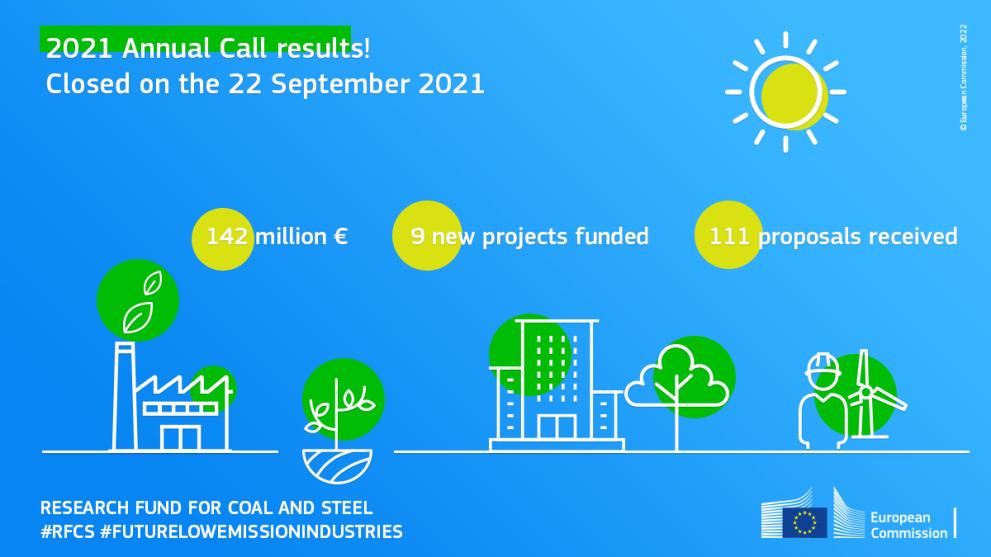
Rising energy costs and the increasing challenges of climate change on the environment stress the need for accelerating the transition to more efficient and low-emission industries. With a budget of €142 million, the Research Fund for Coal and Steel’s Annual Call represents a key investment and commitment to the EU Green Deal and transition to renewable energy. Today the European Commission is co-funding 9 new projects that will work towards clean steelmaking technologies and repurposing closed coalmines.
New steel projects
DissHeat: Dissemination of heating technology research results for emission minimization and process optimization towards today’s fossil-free heating agenda. Almost half the industrial energy required in Europe is used in thermal processing plants, especially industrial furnaces, which corresponded to an energy consumption of 1650 TWh/yr. The Dissheat project has been set up to elevate and promote knowledge in the large amount of fuel and energy carriers used to reheat steel.
HELIX: Hydrogen embrittlement resistant new steel links solutions for off-shore wind turbines. To increase the use of electricity produced from renewables the full potential of Europe's offshore wind energy has to be developed. HELIX will contribute to unravel how atmospheric and immersed conditions, material composition and microstructure, surface treatment and previous corrosion affect hydrogen embrittlement of high strength steels, particularly on steel fasteners used in offshore wind turbines.
SmartCool: Smart controlled actuator to homogenize the temperature of the transfer bar.
In hot strip mills (HSM), transfer bar cooling units are supposed to ensure an equalization of temperature over the length and width of the steel bar before entering the finishing mill.
The SmartCool project seeks to modernize the transfer bar section with the implementation of a smart transfer bar cooling system. An intelligent control of the transfer bar temperature will lead to better strip steering in the finishing mill and will reduce the number of rolling incidents.
H2transBF2030: Minimisation of CO2 Emissions to new Ironmaking processes until 2030. Targets set by the EU require a 55% decrease of CO2 emissions until 2030. Steel producers have published roadmaps on how to reach this objective. The H2transBF 2030 project will make use of arising synergies from the increasing availability of hydrogen, hydrogen-rich injectants and direct reduced iron during the realisation of the roadmaps until 2030.
ProSynteg: Production of hot hydrogen-rich syngas in integrated plants for efficient injection in the blast furnace and CO2 mitigation. The main objective of the project is to adapt an existing pilot project for the production of H2-rich syngas by dry-reforming of coke oven gas and/or natural gas with hot CO2 from oxy-combustion of coke breeze or alternative solid C sources. The reforming process is designed to be flexible in terms of input streams and to produce optimum syngas for direct injection in a blast furnace, resulting in significant reduction of its coke rate and associated CO2 emissions.
CONSTRUCTADD: Resource-efficient steel CONSTRUCTion using ADDitive manufacturing.
Additive manufacturing (AM) has opened new perspectives in many industries (e.g. aerospace, automotive), providing resource-efficient solutions thanks to the geometric freedom and digitalization. CONSTRUCTADD aims to identify and develop rules and procedures to regulate the use of AM for sustainable steel construction applications.
New coal projects
Winter: Web INTEractive management tool for coal Regions in transition. The WINTER project aims to develop a web interactive platform for the management of coal regions in transition to provide guidance and facilitate stakeholder engagement. The best practices will be identified by exchanging information and knowledge regarding the main transition challenges in each of the pilot regions(Western Macedonia, Ruhr area and Konin area) representing different stages of the transition process (initial stage for Western Macedonia and Konin area and mature stage for Ruhr area).
Pomhaz: Post-Mining Multi-Hazards evaluation for land-planning.The POMHAZ project focuses on improving the hazard assessment and the risk management of abandoned coalmines. The main objective is to improve the methodological knowledge for practical realization of multi-hazards analyses, at the scale of a mining basin, in correlation with the main post-mining hazards. To achieve this objective, the hazards of the abandoned coalmines, their interactions and consequences on the urban development, will be identified and analysed based on multi-criteria approaches and a Decision Support System.
GreenJobs: Leveraging the competitive advantages of end-of-life underground coalmines to maximise the creation of green and quality jobs. GreenJOBS focuses on repurposing end-of-life underground coal mines by deploying emerging renewable energy and circular economy technologies to promote sustainable local economic growth and maximise the number of green, quality jobs.
How were the projects selected?
The new funded projects were selected with the support from independent experts. Every year the RFCS looks for highly qualified independent experts to act as evaluators during the next evaluation exercise.
The 2021 Annual call for proposals opened on 29 June 2021. The European Research Executive Agency (REA) received 111 by the cut-off date on 22 September 2021.
What is the RFCS Annual Call?
The RFCS Annual Call co-finances through grants research and innovation projects in the areas of coal and steel. Every year, the fund supports projects at universities, research centers and private companies. The goal is to lead to advancements in breakthrough technologies leading to near-zero-carbon steelmaking and for managing the just transition of formerly operating coalmines in the process of closure, and related infrastructure in line with the Just Transition Mechanism.
On 19 July 2021, the EU adopted the new RFCS package. This modernisation act aimed to enable the fund to use a portion of the assets of the European Steel and Coal Community (ECSC) in liquidation for the period 2021-27 to provide an annual RFCS allocation (call) of EUR 111 million.
More info:
The electronic submission system, proposal templates and all other relevant documents can be accessed via the Funding and Tenders Portal.
Details
- Publication date
- 25 October 2022
- Author
- European Research Executive Agency
